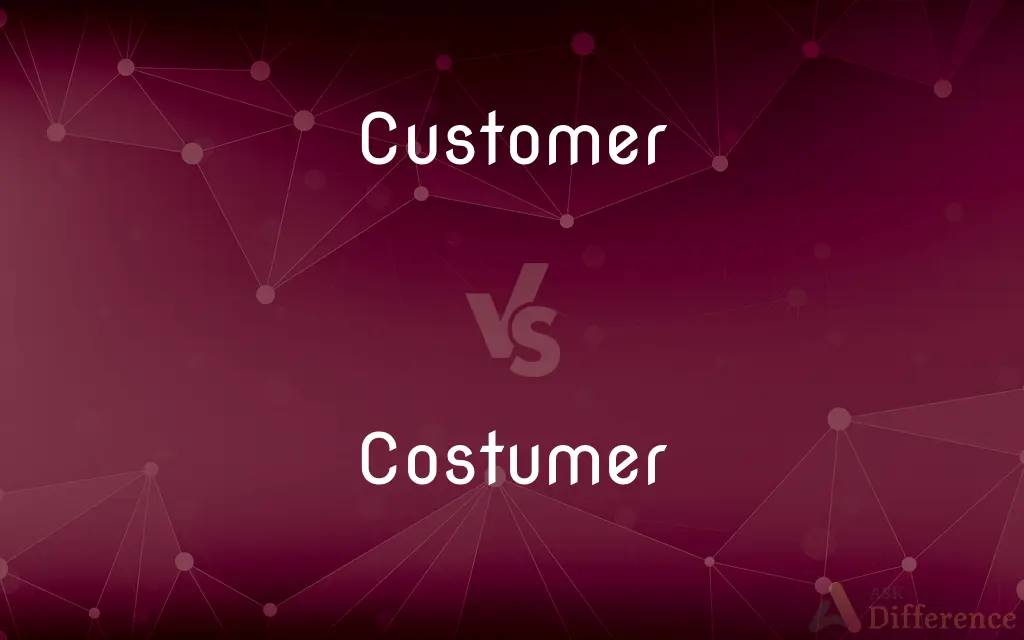Customer vs. Costumer — What's the Difference?
Edited by Tayyaba Rehman — By Fiza Rafique — Updated on November 6, 2023
A customer is someone who buys goods or services, whereas a costumer is someone who makes, supplies, or rents out costumes.

Difference Between Customer and Costumer
Table of Contents
ADVERTISEMENT
Key Differences
Customers are the individuals or businesses who purchase goods or services from a store or company. They are the end-users in the supply chain, and their satisfaction is often a key focus for businesses. A costumer, on the other hand, is a person who designs, creates, or provides costumes for individuals or productions. They work to outfit characters in the entertainment industry or at events.
While a customer engages in transactions to fulfill a need or desire for products or services, a costumer deals in the specific trade of costumes. The customer's role is pivotal in the economy, driving demand and influencing market trends. Costumers support the artistic and theatrical aspects of society, contributing to the cultural and entertainment sectors.
Customers are crucial for the financial health of any commercial enterprise. They make choices based on quality, price, and service, influencing how companies strategize their offerings. Costumers, by contrast, are involved in a more niche market, where they might collaborate closely with directors and actors to achieve a particular vision.
Engagement with customers typically revolves around marketing, sales, and customer service activities. They are courted by businesses through advertising, customer loyalty programs, and customer service initiatives. In contrast, costumers often engage through the creative process, sourcing materials, and working with clients to customize outfits for specific occasions or characters.
Lastly, customers have a broad range of interests and needs that businesses aim to satisfy, spanning across countless industries. Costumers, while they may serve a diverse clientele, are specialized in their field, focusing on the design and production of costumes, whether for individuals, theater companies, or movie studios.
ADVERTISEMENT
Comparison Chart
Definition
A buyer of goods or services.
A maker or supplier of costumes.
Role in Economy
Drives commerce through purchases.
Supports entertainment through costume design.
Industry Involvement
Present in all sectors of commerce.
Primarily involved in the fashion and entertainment sectors.
Relationship with Businesses
Engages with marketing, sales, and service.
Engages with design, production, and fitting of costumes.
Impact
Influences market trends and product demand.
Contributes to the visual and aesthetic elements of performances and parties.
Compare with Definitions
Customer
An end-user of a commercial entity’s goods.
The software company regularly updates its app based on customer feedback.
Costumer
A supplier of outfits for events.
The costumer provided all the masks and gowns for the annual masquerade ball.
Customer
A patron of a particular shop or business.
Every morning, the coffee shop had a line of customers waiting to get their daily brew.
Costumer
A rental service provider for dress-up attire.
The costumer had a wide range of costumes for Halloween.
Customer
A supporter or follower of an enterprise.
The brand’s customers swore by their high-quality products.
Costumer
A creator of theatrical wardrobes.
The costumer spent hours sewing the period costumes for the play.
Customer
In sales, commerce, and economics, a customer (sometimes known as a client, buyer, or purchaser) is the recipient of a good, service, product or an idea - obtained from a seller, vendor, or supplier via a financial transaction or exchange for money or some other valuable consideration.
Costumer
A professional in the costume design industry.
The film’s success was partly credited to the costumer’s stunning designs.
Customer
A person who buys goods or services from a shop or business
Mr Harrison was a regular customer at the Golden Lion
Costumer
One that makes or supplies costumes, as for plays or masquerades.
Customer
A person of a specified kind with whom one has to deal
He's a tough customer
Costumer
A clothes tree.
Customer
One that buys goods or services, as from a store or business.
Costumer
A person who designs, makes or supplies theatrical costumes; a costumier.
Customer
(Informal) An individual with whom one must deal
That teacher is a tough customer.
Costumer
A person who wears a costume or takes part in cosplay.
Customer
(obsolete) A habitual patron, regular purchaser, returning client; one who has a custom of buying from a particular business.
Costumer
(informal) A costume drama.
Customer
A patron, a client; one who purchases or receives a product or service from a business or merchant, or intends to do so.
Every person who passes by is a potential customer.
Costumer
One who makes or deals in costumes, as for theaters, fancy balls, etc.
Customer
(informal) A person, especially one engaging in some sort of interaction with others.
A cool customer, a tough customer, an ugly customer
Costumer
Someone who designs or supplies costumes (as for a play or masquerade)
Customer
A native official who exacted customs duties.
Costumer
A specialist in custom outfitting for performers.
The opera hired a renowned costumer to handle their elaborate wardrobe needs.
Customer
One who collect customs; a toll gatherer.
The customers of the small or petty custom and of the subsidy do demand of them custom for kersey cloths.
Customer
One who regularly or repeatedly makes purchases of a trader; a purchaser; a buyer.
He has got at last the character of a good customer; by this means he gets credit for something considerable, and then never pays for it.
Customer
A person with whom a business house has dealings; as, the customers of a bank.
Customer
A peculiar person; - in an indefinite sense; as, a queer customer; an ugly customer.
Customer
A lewd woman.
Customer
Someone who pays for goods or services
Customer
A purchaser of products or services.
The store welcomed its 1000th customer with a gift basket.
Customer
A client of a professional service provider.
As a real estate agent, she prides herself on her long list of satisfied customers.
Common Curiosities
Do costumers only work in theater?
No, costumers work in various industries, including film, television, and event planning.
Are customers only individuals?
No, customers can be individuals, businesses, or organizations.
Are all costumers also designers?
While many costumers design costumes, others may only rent or sell pre-made costumes.
What is the primary role of a customer?
A customer's primary role is to purchase goods or services from businesses.
Can the term costumer refer to a company?
Yes, a costumer can be an individual or a company specializing in costume design and supply.
Can a business be a customer?
Yes, businesses often purchase goods or services from other businesses.
Is a costumer involved in fashion design?
Yes, costumers often have skills in fashion design, specifically tailored to creating costumes.
Does a customer have a role in product development?
Customer feedback can significantly influence product development and improvement.
What determines a good customer experience?
Quality products, good customer service, and fair pricing typically contribute to a good customer experience.
What skills are important for a costumer?
Artistic talent, creativity, sewing, and knowledge of historical fashion are key skills for a costumer.
Can costumers work freelance?
Many costumers work freelance, providing services to various clients or productions.
Can a person be both a customer and a costumer?
Yes, a person can be a customer when buying and a costumer when designing or supplying costumes.
Is customer loyalty important for businesses?
Yes, it leads to repeat business and referrals, which are crucial for long-term success.
Do costumers need specific education?
Formal education in fashion or costume design can be beneficial, but practical experience is also highly valued.
How do businesses attract customers?
Through marketing, promotions, quality products, and excellent customer service.
Share Your Discovery

Previous Comparison
Surficial vs. Superficial
Next Comparison
Pioneer vs. ExplorerAuthor Spotlight
Written by
Fiza RafiqueFiza Rafique is a skilled content writer at AskDifference.com, where she meticulously refines and enhances written pieces. Drawing from her vast editorial expertise, Fiza ensures clarity, accuracy, and precision in every article. Passionate about language, she continually seeks to elevate the quality of content for readers worldwide.
Edited by
Tayyaba RehmanTayyaba Rehman is a distinguished writer, currently serving as a primary contributor to askdifference.com. As a researcher in semantics and etymology, Tayyaba's passion for the complexity of languages and their distinctions has found a perfect home on the platform. Tayyaba delves into the intricacies of language, distinguishing between commonly confused words and phrases, thereby providing clarity for readers worldwide.
















































